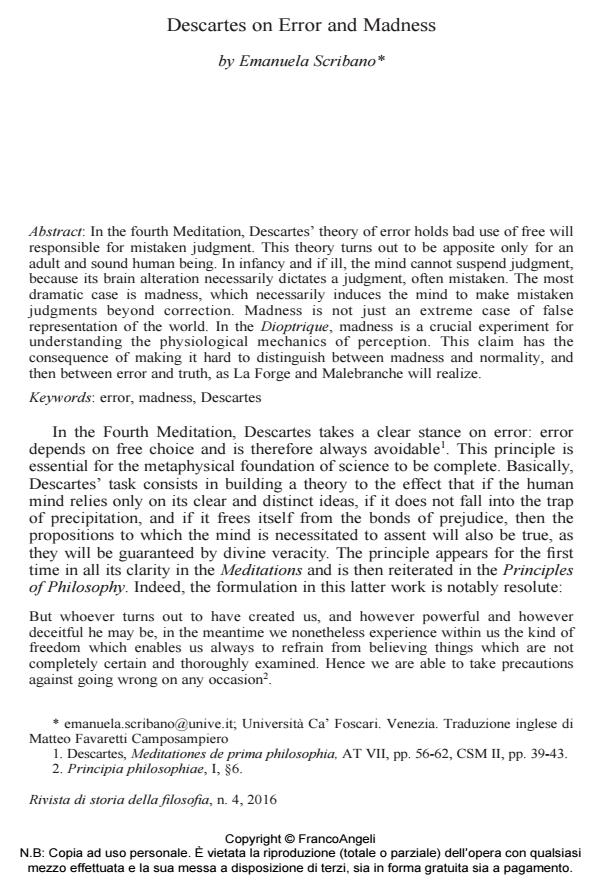Descartes on Error and Madness
Titolo Rivista RIVISTA DI STORIA DELLA FILOSOFIA
Autori/Curatori Emanuela Scribano
Anno di pubblicazione 2016 Fascicolo 2016/4
Lingua Inglese Numero pagine 15 P. 599-613 Dimensione file 53 KB
DOI 10.3280/SF2016-004004
Il DOI è il codice a barre della proprietà intellettuale: per saperne di più
clicca qui
Qui sotto puoi vedere in anteprima la prima pagina di questo articolo.
Se questo articolo ti interessa, lo puoi acquistare (e scaricare in formato pdf) seguendo le facili indicazioni per acquistare il download credit. Acquista Download Credits per scaricare questo Articolo in formato PDF

FrancoAngeli è membro della Publishers International Linking Association, Inc (PILA), associazione indipendente e non profit per facilitare (attraverso i servizi tecnologici implementati da CrossRef.org) l’accesso degli studiosi ai contenuti digitali nelle pubblicazioni professionali e scientifiche.
In the fourth Meditation, Descartes’ theory of error holds bad use of free will responsible for mistaken judgment. This theory turns out to be apposite only for an adult and sound human being. In infancy and if ill, the mind cannot suspend judgment, because its brain alteration necessarily dictates a judgment, often mistaken. The most dramatic case is madness, which necessarily induces the mind to make mistaken judgments beyond correction. Madness is not just an extreme case of false representation of the world. In the Dioptrique, madness is a crucial experiment for understanding the physiological mechanics of perception. This claim has the consequence of making it hard to distinguish between madness and normality, and then between error and truth, as La Forge and Malebranche will realize.
Parole chiave:Error, madness, Descartes
- Heidegger frente a Husserl en la Introducción a la investigación fenomenológica Hernán Gabriel Inverso, in Estudios de Filosofía /2017 pp.49
DOI: 10.17533/udea.ef.n56a04 - Conceivability Errors and the Role of Imagination in Symbolization
Lucia Oliveri, in JoLMA /2021
DOI: 10.30687/Jolma/2723-9640/2021/02/002 - Discurso, exclusión y locura en Descartes Benito Arbaizar Gil, in Revista de Filosofía (Madrid) /2022 pp.1
DOI: 10.5209/resf.72650
Emanuela Scribano, Descartes on Error and Madness in "RIVISTA DI STORIA DELLA FILOSOFIA" 4/2016, pp 599-613, DOI: 10.3280/SF2016-004004